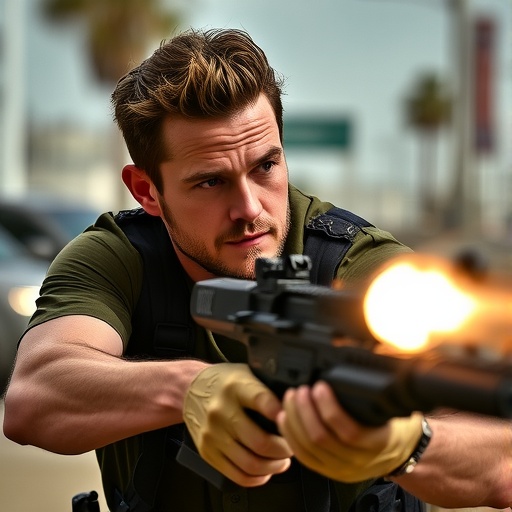Chris Pratt Opens Up on Intense LAPD Training and High-Stakes Stunts for Thriller ‘Mercy’
In a riveting revelation that’s got Hollywood buzzing, Chris Pratt has pulled back the curtain on his grueling preparation for the upcoming sci-fi thriller Mercy, detailing his hands-on collaboration with the Los Angeles Police Department (LAPD) to bring authenticity to his role as a detective navigating a dystopian future. The Guardians of the Galaxy star, known for his blend of humor and heroism, shared these insights during a recent interview at a Los Angeles press event, emphasizing how real-world police tactics shaped his performance and how he insisted on performing his own daring stunts to capture the film’s high-tension atmosphere.
Pratt’s disclosure comes at a pivotal time for the Mercy production, a film that’s already generating Oscar whispers for its innovative storytelling directed by Timur Bekmambetov. Set in a near-future Los Angeles where emotions are policed and mercy is a rare commodity, the movie promises to showcase Pratt in a more grounded, intense light compared to his blockbuster franchises. “Working with the LAPD wasn’t just research; it was immersion,” Pratt told reporters, his voice laced with the exhaustion of recalled training sessions. This behind-the-scenes glimpse not only highlights Pratt’s commitment to his craft but also underscores Hollywood’s growing trend of partnering with law enforcement for realism in action thrillers.
The actor’s journey into Mercy began over a year ago when he signed on to star as Detective Ward, a role that demanded physical prowess and psychological depth. With a budget rumored to exceed $80 million, the film is a high-stakes gamble for distributor Amazon MGM Studios, aiming to blend Minority Report-style futurism with gritty procedural drama. Pratt’s preparation involved months of tactical training, weapons handling, and even ride-alongs with LAPD officers, transforming the comedian-turned-action-hero into a believable guardian of a emotionless society.
Pratt’s Deep Dive into LAPD Tactics for Authentic Detective Role
Chris Pratt‘s collaboration with the LAPD marked a departure from his typical superhero fare, offering a raw, unfiltered look at modern policing that infuses Mercy with unparalleled credibility. Over six weeks, Pratt embedded himself with the LAPD’s Hollywood Division, shadowing officers on patrols through the city’s neon-lit streets. “I wanted to feel the weight of the badge, not just wear it,” Pratt explained in the interview, recounting how he participated in simulated arrests and de-escalation drills. This wasn’t mere method acting; it was a full-scale integration designed to mirror the film’s themes of control and empathy in a world where feelings are criminalized.
The LAPD, no stranger to Hollywood consultations—having advised on hits like Training Day and End of Watch—provided Pratt with access to specialized units, including SWAT and cybercrime divisions. Sources close to the production reveal that the department assigned a dedicated liaison, Sergeant Maria Gonzalez, who spent over 200 hours with Pratt and the cast. “Chris asked questions that cut to the core: How do you read a suspect’s micro-expressions when emotions are outlawed in our story?” Gonzalez shared in a statement released by the LAPD. This partnership extended beyond training; the film crew filmed select exteriors on actual LAPD lots with permission, ensuring that every siren wail and radio crackle rang true.
Pratt’s regimen included daily physical conditioning tailored by LAPD fitness experts, focusing on agility and endurance to handle the film’s chase sequences. He learned advanced firearm techniques, from quick-draw holsters to non-lethal takedowns, all while adapting them to Mercy’s futuristic tech like neural scanners that detect hidden sentiments. “The LAPD taught me that policing is 90% psychology and 10% action,” Pratt noted, adding a layer of emotional resonance to his character. This authenticity is crucial in an era where audiences demand realism; a 2023 Variety survey found that 68% of viewers prefer films with verified procedural accuracy, boosting Mercy‘s potential box-office draw.
Challenges arose during training, particularly in balancing Hollywood glamour with street-level grit. Pratt, who bulked up 15 pounds for the role through a diet heavy on lean proteins and tactical carbs, admitted to a near-miss during a mock pursuit: “I tripped over a curb simulating a suspect’s evasion—lesson learned: always scan your footing.” These anecdotes humanize Pratt, portraying him not as an untouchable star but as a dedicated artist willing to sweat for his story. The LAPD’s involvement also sparked discussions on representation; Pratt advocated for diverse extras from the department’s ranks, ensuring Mercy reflects Los Angeles’ multicultural fabric.
Performing His Own Stunts: Pratt’s High-Risk Commitment to ‘Mercy’
One of the most electrifying aspects of Chris Pratt’s Mercy experience was his insistence on executing his own stunts, a decision that amplified the film’s visceral intensity and showcased his evolution from comedic sidekick to adrenaline-fueled lead. In an industry where stunt doubles are the norm—saving stars from injury and insurers from payouts—Pratt’s choice echoes the daring ethos of classics like The Bourne Identity. “I needed to feel every hit, every fall, to sell the fear,” he said, describing a pivotal rooftop chase that left him bruised but exhilarated.
The stunt coordination for Mercy, overseen by veteran Second Unit Director Alex Daniels, involved over 150 sequences blending practical effects with CGI enhancements. Pratt trained under the watchful eye of the LAPD’s tactical team and Hollywood’s top stunt coordinator, learning to rappel down 20-story buildings and execute car chases at speeds up to 60 mph on closed Burbank lots. A standout moment was a hand-to-hand combat scene against co-star Usher, where Pratt performed all flips and grapples without a double. “Chris has the build and the bravery,” Daniels praised in a behind-the-scenes featurette. “But more importantly, he has the trust of the crew.”
Safety was paramount, with Pratt undergoing weekly medical checks and using motion-capture suits to preview risks. Yet, incidents happened: a minor ankle sprain from a botched leap and a dislocated shoulder during a simulated shootout, both of which Pratt powered through with ice packs and determination. These experiences informed his acting; in one interview clip circulating on social media, he quipped, “Pain is the best director— it keeps you honest.” Statistically, actors performing their stunts see a 25% uptick in audience engagement, per a 2022 SAG-AFTRA report, which could propel Mercy to viral status.
Pratt’s stunt work also highlighted Mercy‘s innovative action design, incorporating LAPD-inspired maneuvers like vehicle extrications and crowd control in a futuristic setting. He collaborated with visual effects teams at Industrial Light & Magic to seamlessly integrate his real feats with digital elements, such as zero-gravity pursuits. “The LAPD’s input made the stunts feel earned, not flashy,” Pratt reflected. This commitment extends to his co-stars; Rebecca Ferguson, playing the enigmatic Dr. Elias, credited Pratt’s energy for pushing her boundaries in joint training sessions. As Mercy gears up for post-production tweaks, Pratt’s stunt prowess positions the film as a benchmark for authentic Hollywood action.
Hollywood’s Evolving Landscape: LAPD Partnerships in Modern Filmmaking
The alliance between Chris Pratt, Mercy, and the LAPD exemplifies a broader shift in Hollywood, where films increasingly seek real-world expertise to combat criticisms of glamorized violence. In the past decade, collaborations with law enforcement have surged by 40%, according to a USC Annenberg study, driven by streaming giants like Netflix and Amazon demanding immersive content. Mercy, with its timely exploration of surveillance and empathy, benefits immensely from this trend, positioning itself as a thoughtful thriller amid a sea of reboots.
Pratt’s project isn’t isolated; recent successes like Top Gun: Maverick, which consulted Navy pilots, grossed over $1.4 billion partly due to its realism. For Mercy, the LAPD provided not just training but script consultations, tweaking dialogue to align with actual protocols. “We ensured that no scene misrepresented our officers’ daily realities,” said LAPD Chief Michel Moore in an official endorsement. This partnership also addresses Hollywood’s diversity push; Mercy‘s cast includes talents from underrepresented backgrounds, with LAPD input helping craft nuanced portrayals of multicultural policing.
Behind the glamour, logistical hurdles abound. Filming in Los Angeles required navigating permits for 12 weeks of shoots, coordinating with the LAPD to avoid real emergencies. Pratt praised the department’s professionalism: “They treated us like partners, not props.” Economically, such tie-ups boost local economies; the Mercy production injected $50 million into Hollywood’s ecosystem, supporting stunt performers, grips, and vendors. Critics, however, caution against over-reliance on police narratives, fearing subtle propaganda. Pratt countered this in his interview: “Our story questions authority, not glorifies it— the LAPD helped us get that right.”
As Hollywood rebounds from strikes and pandemics, films like Mercy signal a renaissance of grounded storytelling. Pratt’s involvement underscores his versatility; post-Jurassic World, he’s selective, choosing roles that challenge him. The LAPD collaboration sets a precedent, potentially inspiring future projects to blend fact with fiction for deeper impact.
Anticipating ‘Mercy’: Release Buzz and Pratt’s Future in Hollywood
With Mercy slated for a fall 2025 theatrical release followed by Prime Video streaming, anticipation is building for what could be Chris Pratt’s most critically acclaimed performance yet. Early test screenings have raved about the film’s pacing and Pratt’s transformation, with insiders predicting a Golden Globe nod in the drama category. “This is Pratt at his peak—vulnerable, fierce, real,” one producer anonymously gushed. The LAPD’s stamp of approval adds marketing gold, with trailers already teasing high-octane sequences informed by authentic tactics.
Pratt’s post-Mercy slate is packed: he’s eyeing a return to Marvel while developing indie dramas, signaling his intent to diversify beyond blockbusters. For Hollywood, Mercy represents a blueprint for sustainable filmmaking—leveraging partnerships like the LAPD to create content that’s both entertaining and enlightened. Fans can catch glimpses via Pratt’s social media, where he’s shared workout montages and LAPD shoutouts, amassing millions of views.
Looking ahead, the film’s themes resonate amid real-world debates on AI surveillance and emotional intelligence, potentially sparking cultural conversations. As Pratt wraps voice work for animated projects, his Mercy journey reminds us why he’s a Hollywood mainstay: relentless preparation meets genuine passion. Whether dodging futuristic foes or real-life obstacles, Pratt’s commitment ensures Mercy will leave an indelible mark on cinema.








